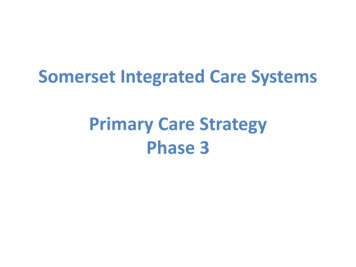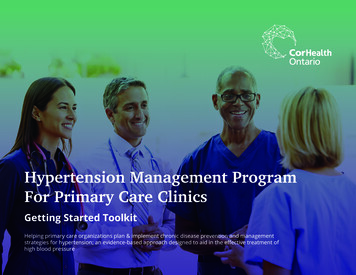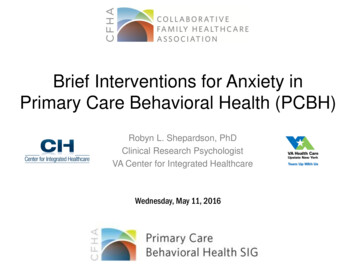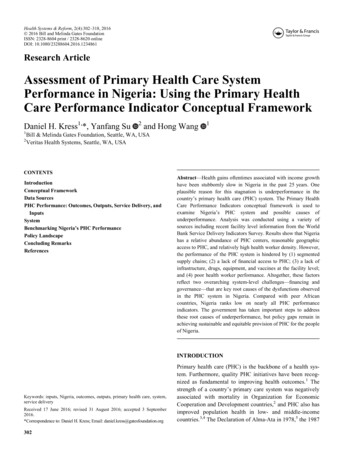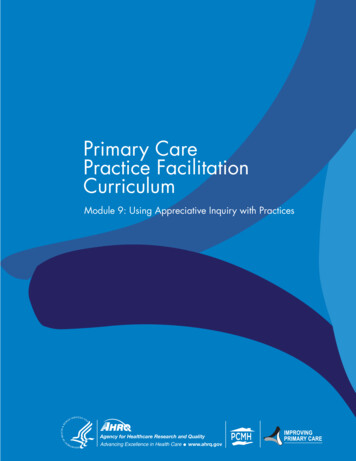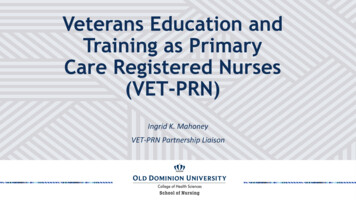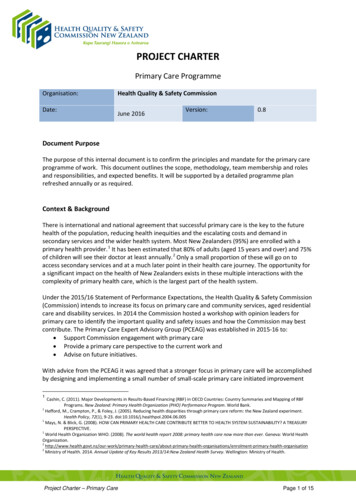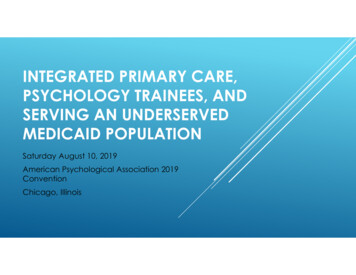
Transcription
INTEGRATED PRIMARY CARE,PSYCHOLOGY TRAINEES, ANDSERVING AN UNDERSERVEDMEDICAID POPULATIONSaturday August 10, 2019American Psychological Association 2019ConventionChicago, Illinois
Kathleen Ashton, Ph.D., ABPP Shirley Ann Higuchi, JD Catherine L. Grus, PhD Winnie Fong, PsyD Peter Liggett, Ph.D. Alan Nessman, JDINTEGRATED PRIMARY CARE, PSYCHOLOGYTRAINEES, AND SERVING AN UNDERSERVEDMEDICAID POPULATION
DC MEDICAID PILOT PROJECTShirley Ann Higuchi, JDAssociate Executive Director, Legal and Regulatory AffairsAmerican Psychological Association
DC MEDICAID PILOT PROJECT – OVERVIEW Innovativepilot project launched in 2018 by APA and the DCPsychological Association Placedsupervised psychology trainees in two primary care officesserving the DC Medicaid population (Summer 2018) Supervisedservices provided by interns and a post-doctoral Fellowwere reimbursed by a Medicaid managed care organization (MMCO) Projectpartners:Primary care practice serving DC Medicaid beneficiaries AmeriHealth Caritas DC (the District’s largest MMCO) Argosy University/Mid-Atlantic Internship Consortium
DC MEDICAID PILOT PROJECT – ORIGINS Project grew out of pre-existing Medicaid advocacy efforts of APA’sPractice and Education Directorates Since 2015, Practice and Education have worked together to increasethe number of Medicaid programs that: reimburse for services provided by doctoral psychology interns allow psychologists and trainees to bill Health & Behavior codes reimburse independently-practicing psychologists
DC MEDICAID PILOT PROJECT – ORIGINS Thegoal of these efforts is to: increasethe access of underserved populations to behavioralhealth care services builda pipeline of psychologists trained to provide integratedservices to those populationsthe internship imbalance created by several factors,including difficulties in funding training sites and sustainingexisting slots correct
DC MEDICAID PILOT PROJECT – ORIGINS Because these were cross-cutting efforts, Education and Practicecollaborated to create an APA attorney position in 2015 dedicated toMedicaid advocacy on the issues noted previously. Since 2015, ten additional states now permit Medicaid reimbursementfor supervised trainees, for a total of 25. Each of these 25 states handles trainee reimbursement differently (e.g.,reimbursement is setting or facility specific, services are billed throughthe supervisor, services are billed at a reduced rate, etc.)
DC MEDICAID PILOT PROJECT –IMPLEMENTATION DC Medicaid does not reimburse for services provided by internsbecause they aren’t licensed providers. In order to implement the PilotProject, APA needed to overcome this regulatory hurdle. MMCOs often have more flexibility than standard FFS Medicaid, whichallows them to test innovative payment strategies, including internreimbursement. So, instead of advocating for changes to DC’s Medicaid regulations (alengthy, bureaucratic process), APA decided to approach AmeriHealthCaritas DC.
DC MEDICAID PILOT PROJECT –IMPLEMENTATION Working with outside counsel, APA contacted AmeriHealth executivesto “pitch” the Pilot Project and secure the company’s participation. AmeriHealth needed to increase the behavioral health care servicesavailable to its members. The Pilot Project could help meet that needby providing high-quality psychology trainees to deliver thoseservices in an integrated care setting. AmeriHealth agreed to reimburse supervised trainees (interns and apost-doc) and to identify a primary care practice (PCP) with a highvolume of AmeriHealth members that was willing to join the Project.
DC MEDICAID PILOT PROJECT –IMPLEMENTATION Argosy University (Northern Virginia) and the Mid-Atlantic InternshipConsortium (MAIC), an APA-accredited internship program, provided 11interns for the Project and a supervisor licensed in DC. Beginning in June 2018, the interns were at the PCP one day per week forsix weeks, gaining experience in integrated care by providing supervisedbehavioral health care services in a primary care setting. Dr. Winnie Fong, a post-doctoral Fellow, served her post-doc year (May2018-May 2019) at the PCP and helped facilitate the interns’ time there. AmeriHealth reimbursed for services provided by Dr. Fong and the interns.
PHASE II – MORE STATES, MORE PROJECTS DC was the first Pilot Project. We learned a lot through planning andimplementing it, and providing support to our Project partners from launchthrough to completion. Early this year, we began Phase II of our effort, which is to launch similarprojects in other states. At Practice Leadership Conference in March, we met with attendees fromfour “target” states: Delaware, Louisiana, Pennsylvania, and Washington,to discuss launching a project in their states. We’ll provide more detail on Phase II later in this program. (If you’reinterested in your state as a possible site for a Phase II project, speak withus after the presentation!)
INTEGRATED CARE AND ITSIMPORTANCE IN TRAININGPSYCHOLOGISTSCatherine L. Grus, PhDActing Chief Education OfficerAmerican Psychological Association
WHAT IS INTEGRATED PRIMARY CARE?“The care that results from a practice team ofprimary care and behavioral health clinicians,working together with patients and families,using a systematic and cost-effectiveapproach to provide patient-centered care fora defined population to address behavioralhealth care.” (Peek 2013)
WHY INTEGRATE?Why don’t more people receive behavioral healthservices? StigmaMistrustTimeCostAccess
WHY INTEGRATE?ThosereceivingBH careThose Who MightBenefit From BHServicesThose notreceivingBH care
80% of individuals will visit their Primary Medical Provider atleast once per year 50-70% of medical visits have psychosocial basis 50% of primary care patients have clinically elevated anxiety ordepressive symptoms 50% of all behavioral health care is delivered by a primarymedical providerWHY INTEGRATE?
WHY INTEGRATE? Exposea greater proportion of the population toevidence-based behavioral health assessments andinterventions Achievethe goals of value-based care Increasing Supportsfocus on population healththe triple/quadruple aimEssential to train the workforce to meet these aims
IMPORTANCE OF TRAINING FORINTEGRATED CARE APA research shows that trainees stay: In the state where they are trained AND In the clinical setting where they are trainedThis is powerful evidence to show that investing in trainingpsychologists in a particular state will lead to a stronger workforcethat will remain there
IMPORTANCE OF TRAINING This makes it essential that individuals train and serve Medicaidpopulations to ensure a uniquely knowledgeable workforce for theirparticular area. Training in an integrated care setting is especially conducive toserving these populations, who often have complex medical andmental health needs.
IMPORTANCE OF TRAININGAPA has worked to facilitate training by: Investing in the DC Medicaid project and next steps Developing competencies for psychology practice in primary care Developing educational resources Member of key organizations focused on interprofessionaleducation (e.g., Interprofessional Education Collaborative,Federation of Associations of Schools of the Health Professions)
PRIMARY CARE COMPETENCIES– Focus of 2012 APA PresidentSuzanne Bennett Johnson– Chaired by Susan McDaniel– Six competency domains Science, systems,professionalism, relationships,application, education– Specific to primary care
Interprofessional Seminaron Integrated Primary Care Developed by 2016 APA PresidentSusan McDaniel Goal to develop the competenciesneeded for successful integrated(primary) care practiceTopics: Elements of interprofessional care, Rationale forintegrated primary care, Population health, Ethics,Models of Leadership, Quality Improvement, Health CareFinancing
Interprofessional Seminaron Integrated Primary CareRozensky, R.H., Grus, C.L., Goodie, J. L., Bonin, L., Carpenter, B.D., Miller, B.F., Ross, K.M., Rybarczyk,B.D., Stewart, A., & McDaniel, S.H. (2018). A Curriculum for an Interprofessional Seminar on IntegratedPrimary Care: Developing Competencies for Interprofessional Collaborative Practice. Journal of AlliedHealth, 47, -seminar.aspx
INTERPROFESSIONALPROFESSIONALISM (IPP)Interprofessional Professionalism Collaborative (IPC)MEMBERSAmerican Association of Colleges of Nursing (AACN)American Association of Colleges of Osteopathic Medicine(AACOM)American Association of Colleges of Pharmacy (AACP)American Dental Education Association (ADEA)American Occupational Therapy Association (AOTA)American Physical Therapy Association (APTA)American Psychological Association (APA)American Speech-Language-Hearing Association (ASHA)Association of American Medical Colleges (AAMC)Association of American Veterinary Medical Colleges (AAVMC)Association of Schools and Colleges of Optometry (ASCO)National Board of Medical Examiners (NBME)MISSIONThe purpose of the Interprofessional ProfessionalismCollaborative (IPC) is to develop a valid and reliableassessment instrument for interprofessional professionalismbehaviors and related educational resources for use byeducators across all health professions.VISIONInterprofessional professionalism, practiced by all healthprofessionals, transforms relationships to achieve optimalhealth and wellness.IPP: "Consistent demonstration of core values evidenced by professionals working together, aspiring to and wiselyapplying principles of, altruism and caring, excellence, ethics, respect, communication, accountability to achieveoptimal health and wellness in individuals and communities."
IPP TOOLKIT COMPONENTSIPP TOOL KIT COMPONENTSRESULTSThe IPP Tool Kit includes case scenarios (written narrative,videos, role play), instructional guidance for faculty andpractitioner use in education and practice, and references.Application of the IPA as a component of the IPP Tool Kit is avalid means for understanding, assessing, and developinginterprofessional professionalism.Interprofessional Professionalism Assessment Communication Respect Altruism and Caring Excellence Ethics AccountabilityHow to Use the IPA with Case Scenario Videos Enable discussion to identify behaviorsassociated with interprofessionalprofessionalismAbout Interprofessional Professionalism Learn about the construct of IPP and itsrelationship to quality care and person/familycentered careIPA Development Milestones Timeline to develop the Tool Kit
INTERPROFESSIONAL PROFESSIONALISMASSESSMENT 28-item instrument includes 6 domains (communication, respect, altruism and caring,ethics, excellence, accountability) 26-items rated using a 5-point Likert scale; 2 open-ended summative narratives
COLLABORATIONS
DC MEDICAID PILOT PROJECT:POST-DOCTORAL FELLOW’SEXPERIENCEWinnie Fong, PsyD
CREDENTIALS AND EXPERIENCE Biola University, BA in Psychology The Chicago School of Professional Psychology, PsyD in ForensicPsychology Clinical Practice: school counselor, private practiceneuropsychological assessments, multi-discipline mental healthpractice Dissertation: The Relationship Between Ethnicity and DualDiagnosis to Received Outpatient Treatment on a National Level(2016)
PCP PROJECT PARTNER – LOCATION &WORKFORCE Locatedin Southeast DC (two sites) 1adult full-time PA 2part-time NPs 2part-time Pediatricians 2Medical Assistants 1Dietician 1Psychology Associate / Behavioral Health Consultant (BHC)
PCP PROJECT PARTNER – PATIENT POPULATION &WORK FLOW 10,150patients since 2010 97%Medicaid 50%no-show rate Typical 220week:medical appointments for children and adults 12-15psychotherapy appointments 10-15integrated Behavioral Health Consultation appointments
PATIENT POPULATION – DEMOGRAPHICS & HEALTHISSUES Agerange: newborn - 90 years old Predominantly African-American Healthissues: Diabetes& Hypertension Asthma Sleep Painissuesmanagement Over-diagnosed/self-diagnosed Stress,major mental illnesscircumstances, anger, depression, anxiety
TYPES OF DOCTOR’S VISITS Annualphysicals Consultations Hospital Sickand Labs Follow-upvisits Women’scare Psychotherapy
DAY-TO-DAY BEHAVIORAL HEALTH Annual ACT,physicalsPHQ-9, GAD-7, DASS21, SDQ Consultation(H & B codes) Pre-Diabetes Asthma Newor Diabetes ManagementManagementdiagnosis/adjustment stress management
PATIENT VIGNETTE 14-year-oldmale Seenby pediatrician after annual physical and lab follow-up, found tobe pre-diabetic Discussedhis eating habits; mother noted picky eating Waseating McDonald’s 3 out of 5 days of the week, with frappes andunhealthy snacksreduce to 1 frappe a week, pack healthy snacks (e.g.,nuts, cucumbers) Commitment:
INTERNS’ EXPERIENCE AT THE PCP Oncea week for 6 weeks, as a group of 11 Halfof interns “on call” experience for BHC with supervision Halfof interns planning/organizing a behavioral health wellness day Switchedhalfway through work-day Coachedand “sat in” on post-doc’s BHC sessionsand collected surveys for attitudes toward behavioral healthtreatment – providers, patients, interns/post-doc Administered
CHALLENGES OF INTEGRATED BEHAVIORALHEALTH Stigma– Bulk of session spent informing patients of the importance oftheir mental state, apart from the severe mental illness Matchingmodels – Integrating into practice between psychotherapy andconsultation Billing– Determining what consultation is billable
TRAINING AS AN EARLY CAREERPSYCHOLOGIST Gainfamiliarity with Medicaid population and program How consultation and therapy is different than in other settings Acculturatingwith the medical model and educating staff on mental healthmodel Developingconsultation skills for working with medical professionals Respondingstressingquickly, as needed, to escalating patients that require de-
PROGRAM EVALUATION Primarycare services and their structure are looking to be effective in:1. Basichealth care services provided by a variety of professionalsincluding behavioral health2. A teamthat can deliver at least 70% of the necessary medical andhealth-related social services to the population it servescare access that has maximum flexibility for customizinghealth care to the needs of patients, families, and providers, and3. Healthand cooperative interactions with hospital, communityservices, and other specialty care related to the health caremanagement of their patients (Hunter et al., 2017).4. Coordinated
PROGRAM EVALUATIONThree levels of change are required for a successful integration program: Administration Clinicalproceduresprocedures Referralprocedures
ADMINISTRATIVE & CLINICAL PROCEDURES Checkingin patients becomes a short mental status, monitoring stresslevel AddingBehavioral Health paperwork with medical paperwork Most questionnaires are in the public domainpatients becomes “How are you?” rather than “What are youhere for?” Triaging
ADMINISTRATIVE & CLINICAL PROCEDURES UtilizingBehavioral Health Consultant Where Isdoes BHC fall in rotation (before or after provider?)the patient in a crisis? Warmhand-off Consultationwith clinical staff
REFERRAL PROCEDURES Buildingreliable referral sources Psychiatry Speechand Language Psychotherapy OccupationalTherapy Psychological YogaTestingclasses/fitness classes Nutrition
STATE/ADMINISTRATIVEPERSPECTIVESPete Liggett, Ph.D., Licensed PsychologistDeputy Director, Long Term Living & Behavioral HealthSouth Carolina Dept of Health & Human Services
KEY INGREDIENTS Does your State have the appropriate Medicaid authorities? Are unlicensed, predoctoral clinicians approved providers in the state plan forcommon behavioral health services? Are the desired CPT codes (e.g., Collaborative Care Codes – 99492, 99493 & 99494)covered in the state plan? Can you take advantage of special authorities the state has had approved by CMS(e.g., Health Homes)? Do you have a Medicaid Managed Care plan (or two) willing to contract withproviders who use predoctoral interns? Demonstrate integrated care value for Medicaid beneficiaries & Managed CarePlan members What’s the value proposition?
PHASE II PILOT PROJECTSAlan Nessman, JDSenior Special CounselLegal and Regulatory Affairs, PracticeAmerican Psychological Association
OVERVIEW OF PHASE IIIn exploring states and partners for Phase II, we builton lessons from seminal DC Pilot. Optimal to have: Established,stable APA-accredited internshipprogram Interested,innovative MMCOs, or with whom wehave connections Largerentities with robust infrastructure, e.g.,strong billing department and IT
OPTIMAL CHARACTERISTICS CONT’D Integrated internship program/service delivery siteAlso helps with supervision requirements - supervisors are typically already at the site Partnerswho are already doing integration Multipleoptions for some components, e.g., multiple service delivery sites Huge effort in DC to build integration from scratch Stateassociation partner very interested State leaders directly investedin projectWe also looked to reach additional populations and test the model in newsettings, e.g., hospital based, rural
Despite their diverse nature, the Phase II Pilot Projects have thesame core goals as the first one in DC: Expand services to underserved Medicaid populations Provide reimbursement for intern work to keep internshipprograms viable Demonstrate value of these interventions by trainees Build a pipeline of psychologists trained in serving theMedicaid populationCORE GOALS
Havebeen exploring four states intensively: PA, LA,WA and DE Recentlyalso looking at NC and VA Recognizingfrom DC experience that unanticipatedroadblocks may arise good to have several statesas options Whenwe have several Pilot Projects running in parallel cross fertilization of innovation & solutions betweenProjectsSTATES EXPLORED & CONSIDERED
Initialinterest was from Children’s Hospital of Philadelphia(CHOP) Prestigious Philadelphia hospital system with APA-accreditedinternship program and intern program/delivery sites underone roof Alreadyhas interns providing integrated services, as wellas traditional MH, but no Medicaid reimbursement PennsylvaniaPsychological Association is a great partner –we have worked with them on different projects over theyearsPENNSYLVANIA PHASE II PROJECT
MMCOs:PA Medicaid has complex system - MH and physicalhealth split between different companies, and each county hasa different set of companies CHOP serves Philadelphia and surrounding counties But Keystone and Community Behavioral Health seem to be big MMCOs Goals:1) getting MMCOs to reimburse for services that CHOP isalready providing so they can expand services 2)Getting H&B codes reimbursed for interns and supervisingpsychologists (currently PA Medicaid only reimburses MDs forthese codes designed for psychologists)PENNSYLVANIA PHASE II PROJECT CONT’D
Likely partner: Christiana Healthcare, one of the largest health careentities in DE Internship program & service delivery sites under one roof APA accreditation for internship program is in process Services: Integrated care and possibly ob/gyn, which would be newfor our Pilot Projects MMCOs: Highmark BCBS (have worked well with them on resolvingsome traditional insurance issues) Maybe also AmeriHealth (leveraging contacts we gained via DCProject)May have the same H&B issues as PA – Medicaid not coveringpsychologistsDELAWARE PHASE II PILOT PROJECT
Partneringwith Louisiana State University & Tulane University –both have APA-accredited internship programs Differentfrom other Phase II Pilot Projects in that interns wouldbe providing just be traditional MH services Butthis fits with the City of New Orleans’ current push tofocus on trauma Primaryclinic sites: Tulane Health Sciences Center /Metropolitan Human Services District MMCOs– several (including AmeriHealth)LOUISIANA PHASE II PROJECT p
Biola University, BA in Psychology The Chicago School of Professional Psychology, PsyD in Forensic Psychology Clinical Practice: school counselor, private practice neuropsychological assessments, multi-discipline mental health practice Dissertation: The Relationship Between Ethnicity and Dual
